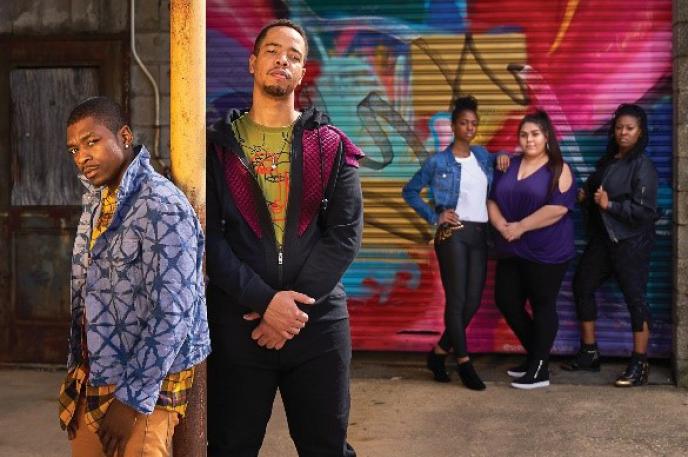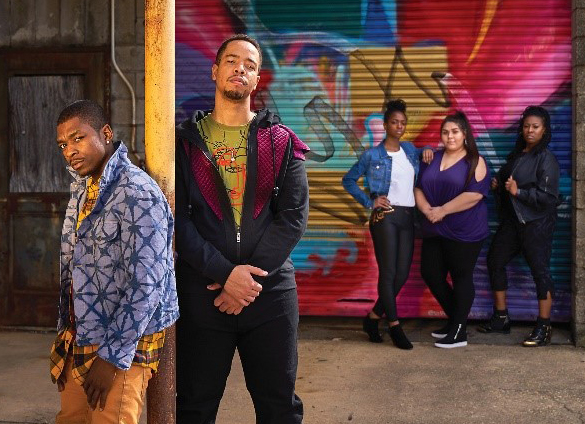
Grimms' Fairytales retold through a hip-hop lens
February 18, 2021
This blog was written as part of Charlotte Mecklenburg Library's Black Lives Matter program initiative. Learn more about the program and corresponding events here.
When the world shut down last March, the show playing at Children’s Theatre of Charlotte (CTC) at ImaginOn: The Joe and Joan Martin Center was the world premiere of Grimmz Fairy Tales, a hip-hop retelling of classic European fairy tales, performed by an all-Black cast with mic-dropping talent. When CTC launched their all-virtual 2020-2021 season, reintroducing Grimmz was at the top of their list.
The show is an inventive remix of familiar classics, telling stories like Snow White and the Seven Shawties, which deals with cyber-bullying, Hansel and Gretel: Lost in the Hood, which addresses the foster care system, Down with Rapunzel, about pursuing your joy despite adversity, and Break, Cinderella. Break, which tackles issues of abuse and neglect and adjusting to mixed families. It was poised for a national tour when the pandemic hit, and now, thanks to the ingenuity of CTC in partnership with Broadway HD, a filmed version of the show can be streamed into every home.
The Charlotte Mecklenburg Library’s Black Lives Matter program blog team got to sit down via Zoom with local artists and Children’s Theatre acting veterans Ron Lee McGill and Rahsheem Shabazz, Grimmz’s co-creators, stars, and emcees, to get their take on what the show’s message means now, more than ever.
Check out our booklist of recommended fairytale reads for even more inspiring stories for the entire family.


LIBRARY: When you started developing Grimmz back in October 2018, the idea was to redefine fairy tales through a legacy of hip hop, but each of the stories you picked also deals with a challenging modern topic. What made you want to tackle such difficult issues in a piece of children’s theatre?
SHABAZZ: Kids deal with divorce or moving into a house with a new stepparent; they’re dealing with this at the age of six, seven, eight, and they don’t know how to process it, and they feel like they’re the only ones going through it. We asked ourselves, “How can we reach kids and give them hope in themselves, to know that they are beautiful, and they are amazing, no matter what situation—what grim situation—they might be in?” In a way, I feel like the kids picked those stories for us.
MCGILL: It definitely speaks to the human side of fairy tales, and in selecting and reading and looking back at the essence of the tales, no matter what is going on, it is representative of the human situation, the human struggle. We were able to use the familiarity of the original pieces, but with a different context that can make different contemporary points.
SHABAZZ: And there’s a call to action: what are you gonna do? What you gonna do when you see someone else in this situation? And what you gonna do when you’re in this situation?
LIBRARY: Speaking of that call to action, do you think the message is going to resonate differently or more powerfully with audiences now, given the activism and discussion surrounding the Black Lives Matter movement this past year?
MCGILL: I would hope so. To be honest with you, the representation of us being on stage says something in and of itself. For better or worse, I felt that being a cast of color may not appeal to every school or every administrator, and being a hip-hop play with European fairy tales may have turned some people off without us even having a chance to express ourselves artistically. I hope for this generation coming up, that we are able to do something good and positive for them. It was worth taking that risk of maybe not being accepted by everyone in order to really connect with those that could see themselves in us. Representation and authenticity—using stories to help humans empathize—is so important.
LIBRARY: Do you feel like the challenges you faced in your youth have more similarities or differences than those faced by the current generation?
SHABAZZ: I think there’s a lot we dealt with that kids still deal with, but then also there’s a pandemic. And I think it’s so different because technology has put everything in your face. No one saw me getting smacked by my teacher or getting jacked up in class. Whatever we went through, no one saw that, but today it’s in your hand in an instant. And as we grow and understand that, now with technology, each of us can see, “Wow, I’m going through this; you’re going through this; we’re all going through this; and we’re all different colors.” I think that’s why I went through the things I did, that’s why Ron went through the things that he went through, because we are here to be the change in the world that we want to see.



LIBRARY: Last question: if there is one piece of advice you’d give to Black youth in your community today, what would it be?
MCGILL: Study who you are. Know who you are. Know your history — your true history going beyond this country. Africa is the birthplace of humans. Period. Be aware of the rich history of life and civilization and culture and every aspect from the ground to the sky, I would advise Black youth to search and understand the roots of their essence and of who they are and to be proud of every bit of it.
SHABAZZ: Love yourself. You are not your environment. You are not your situation, and as you learn your history, build yourself up. Embrace that history and continue to love because sometimes through that history you can brainwash yourself into hatred, so empower yourself and continue to love with no fear. To keep fighting, to keep doing, to keep moving, you show yourself your power.
MCGILL: That’s our obligation as Black men in America and Black men within the world. We owe it to our ancestors, and we owe it to our future generations to continue moving that needle of positive change, to continue having that positive representation, that authenticity, that beauty, and that love within our craft. And we’re doing that in Grimmz in the way we’re using hip-hop and theatre, blending that together and using these wonderful tales to show that we deserve the same love. We deserve and are obligated to give the same love as everyone on the planet.
--
This blog post was written by Becca Worthington, children’s librarian at ImaginOn. The Children’s Theatre of Charlotte’s production of Grimmz Fairy Tales is available for streaming from now through March 31, 2021. Tickets are available at https://ctcharlotte.org/.
Photo credits to John Merrick
